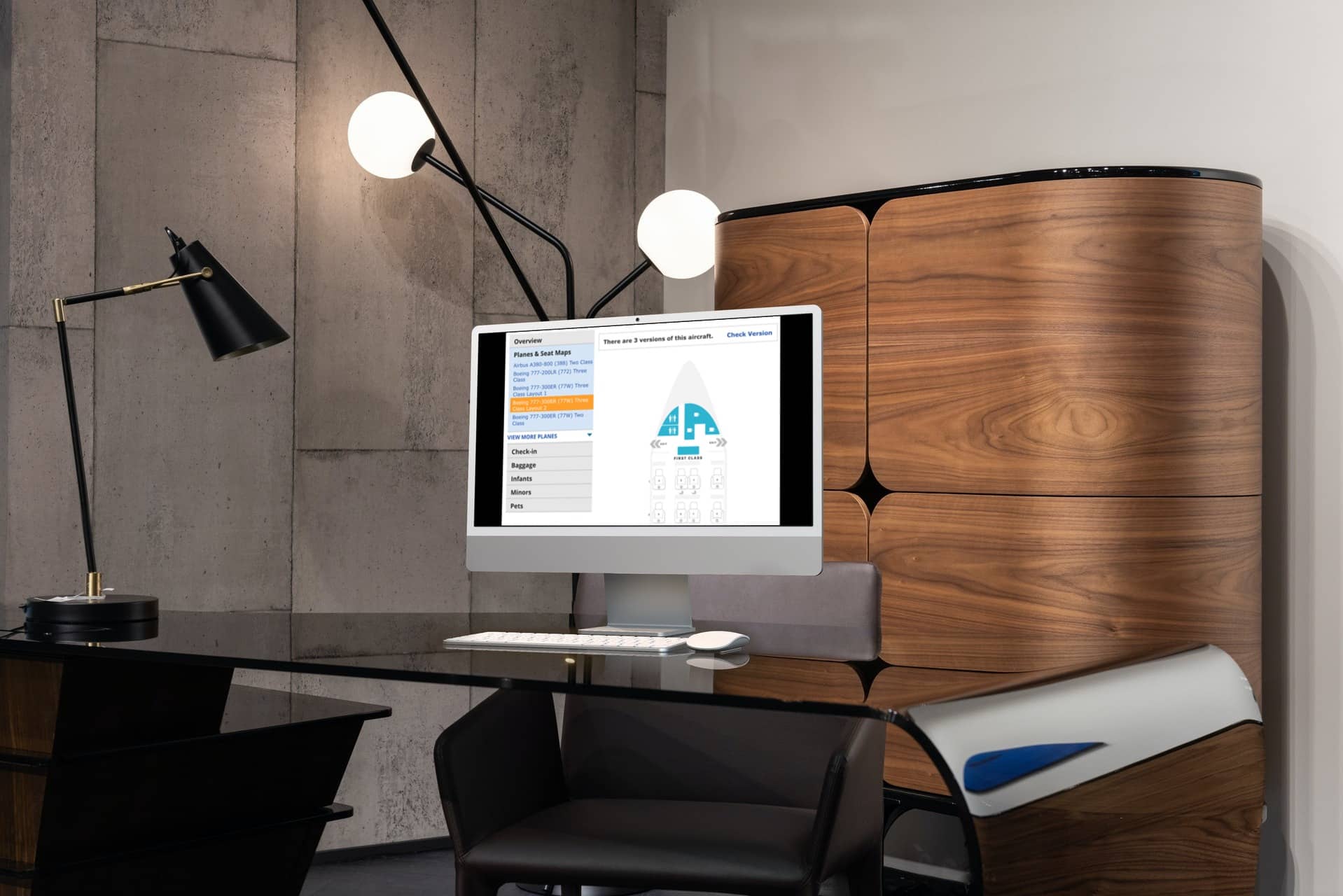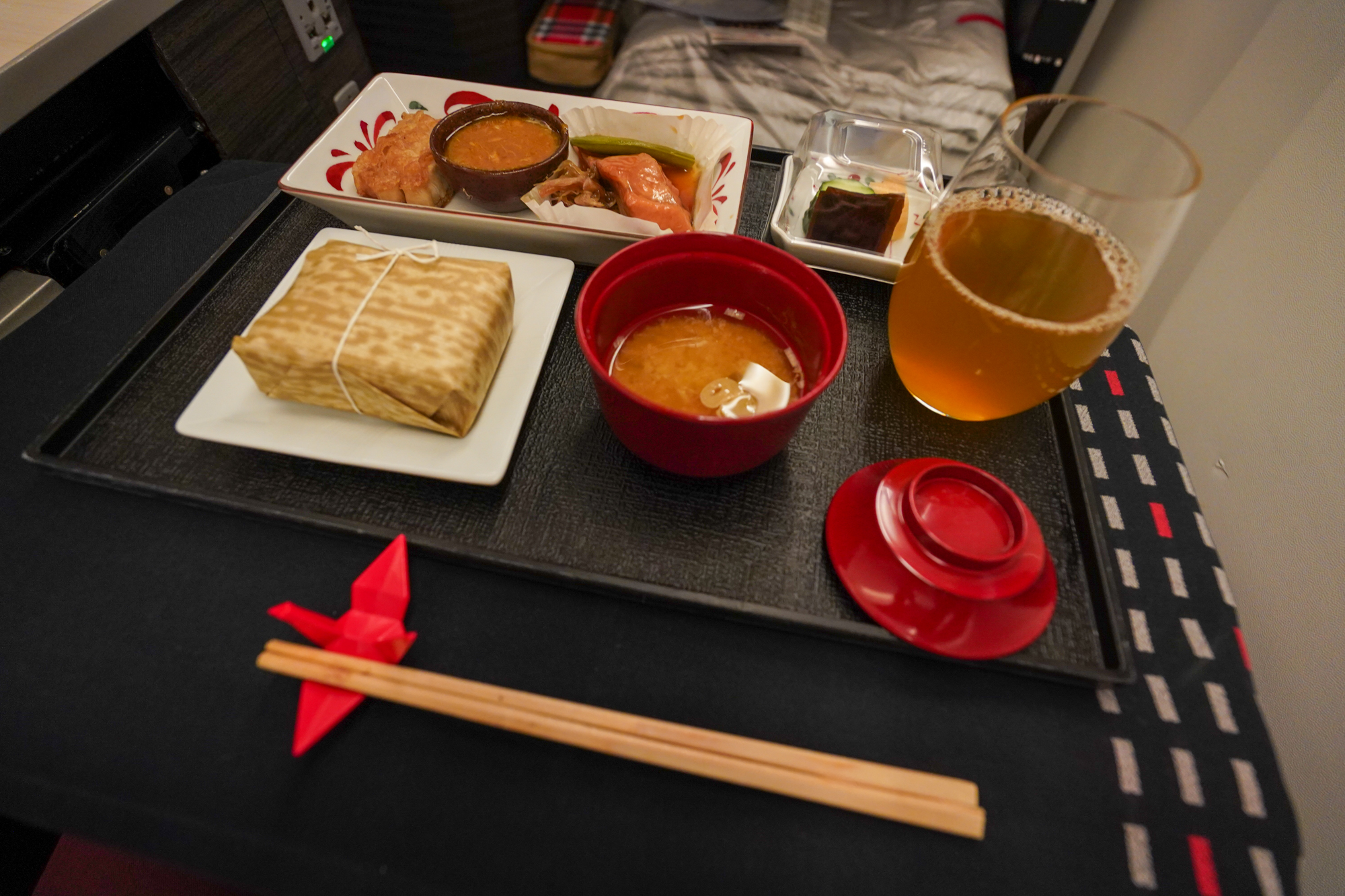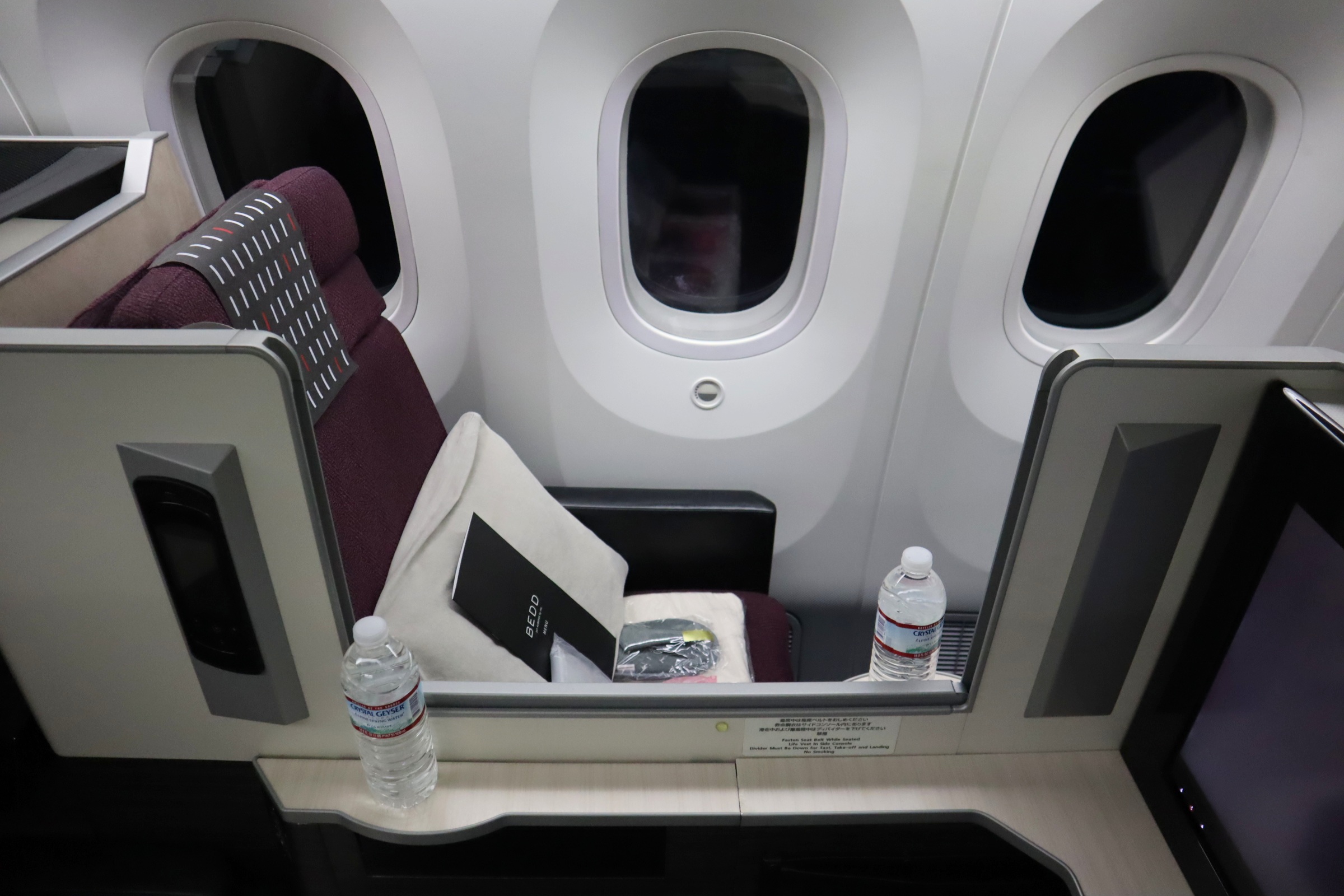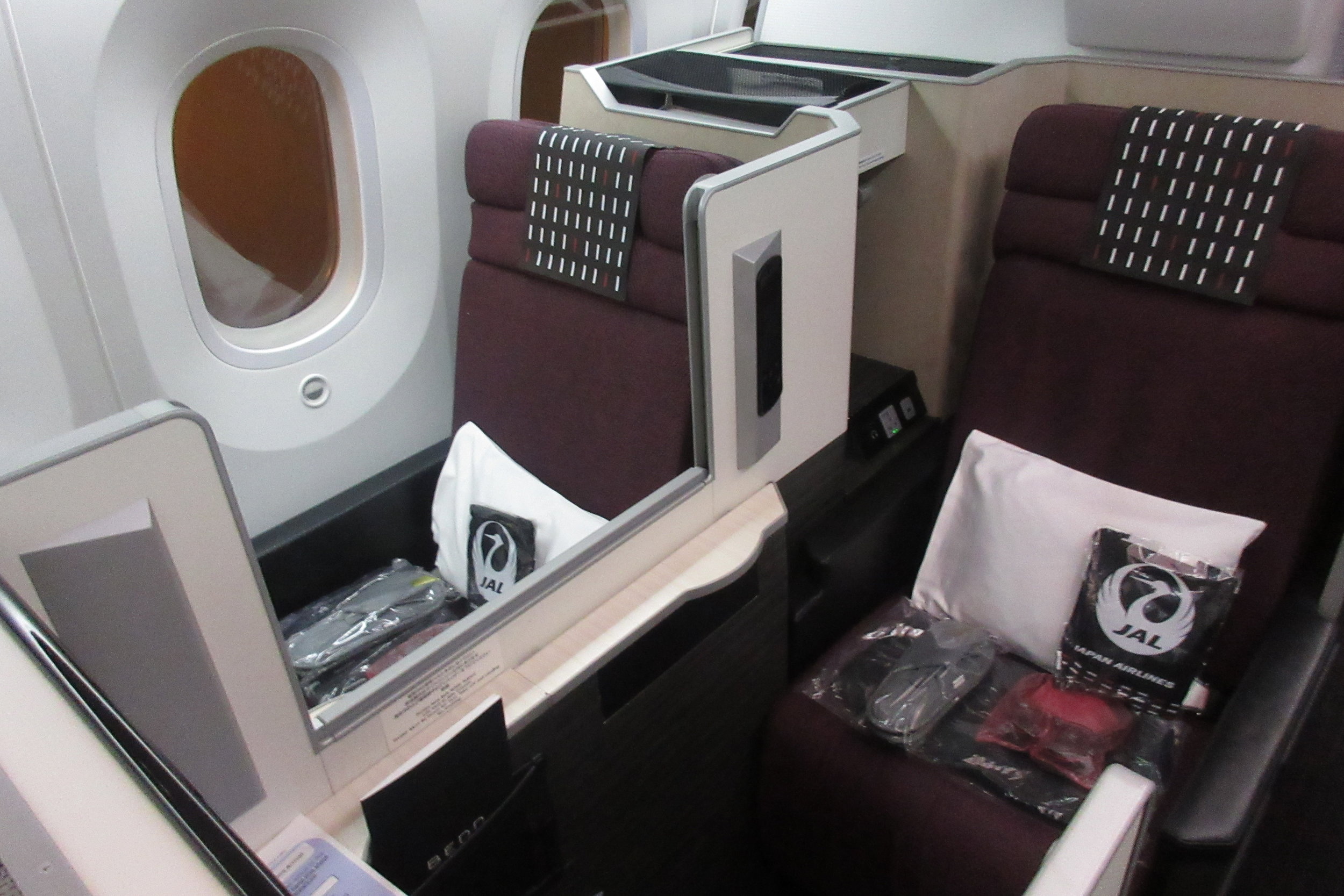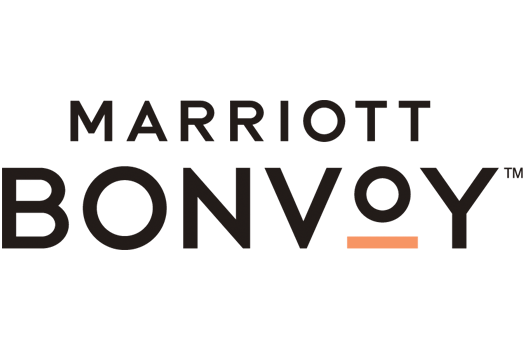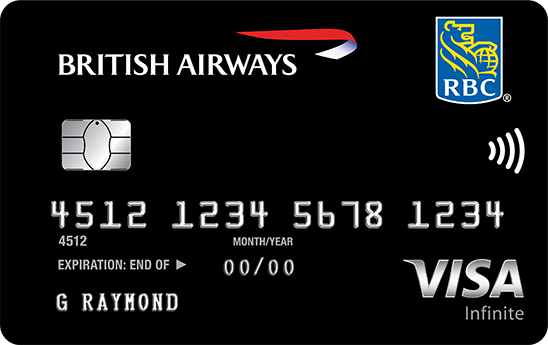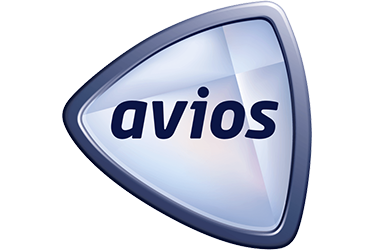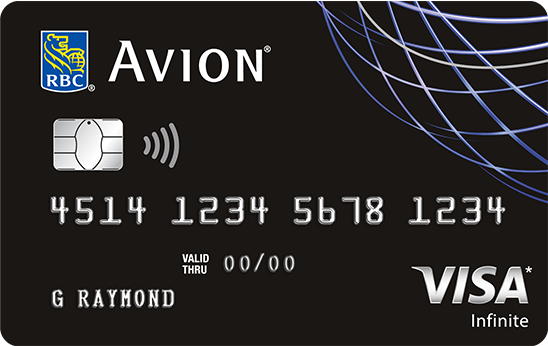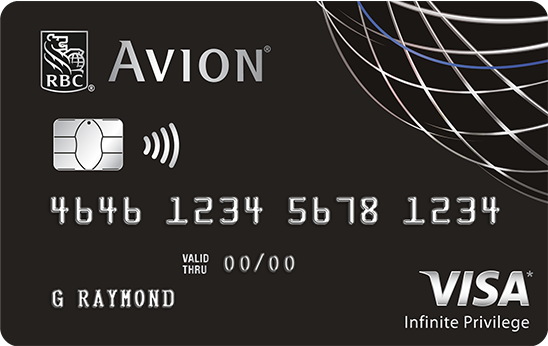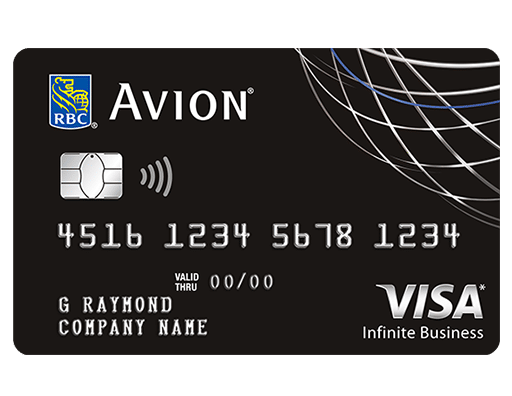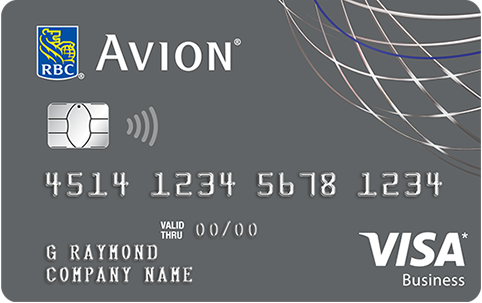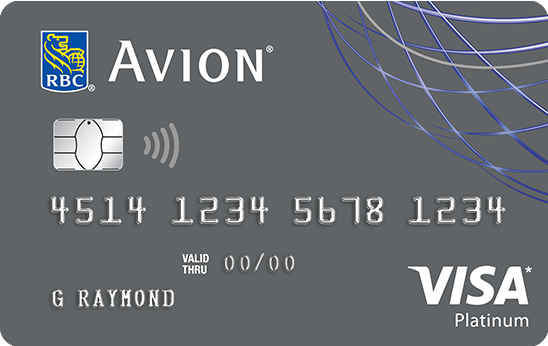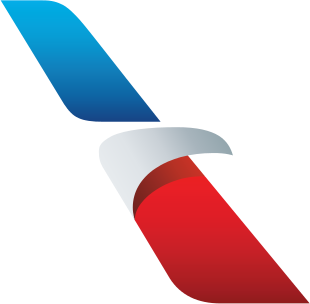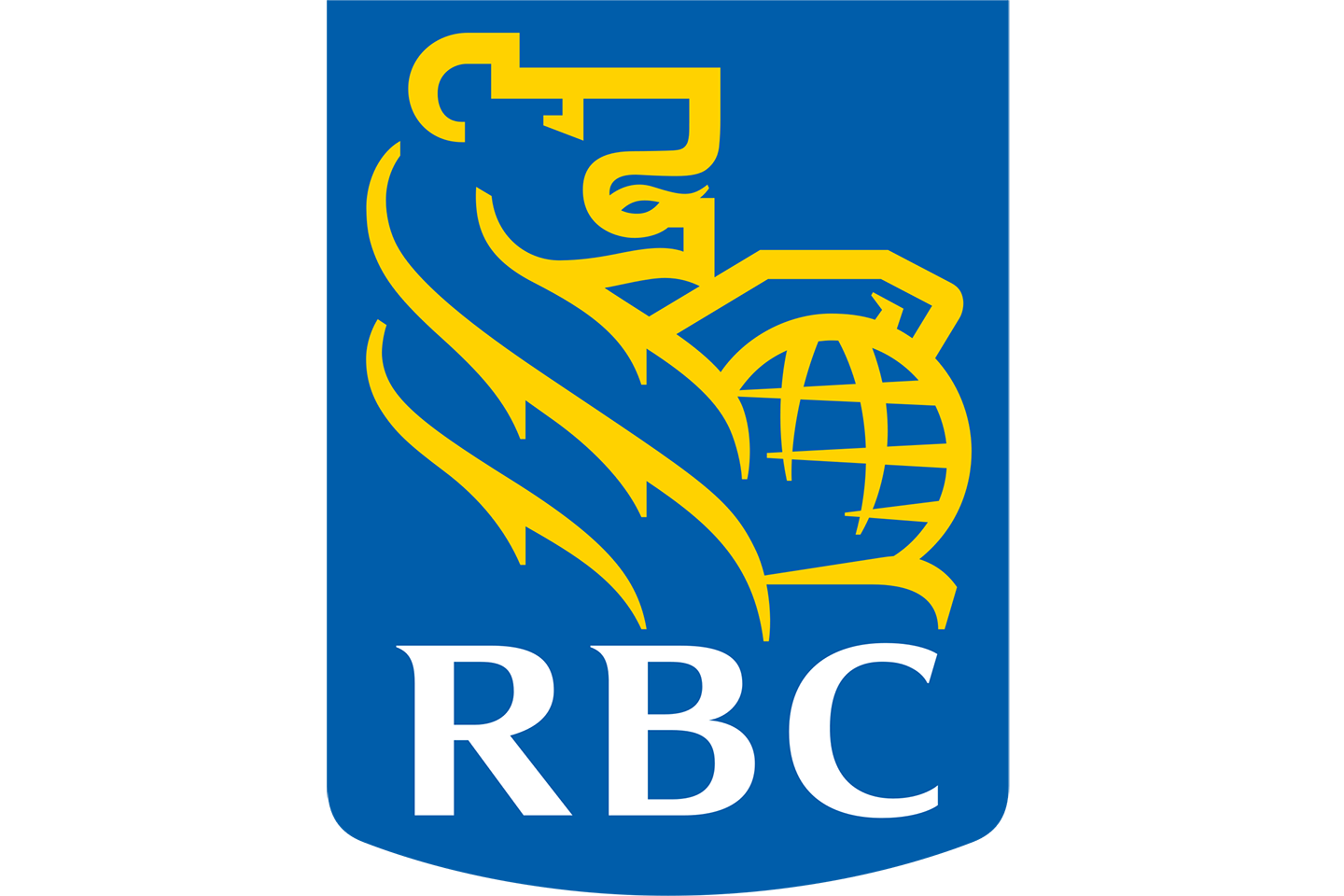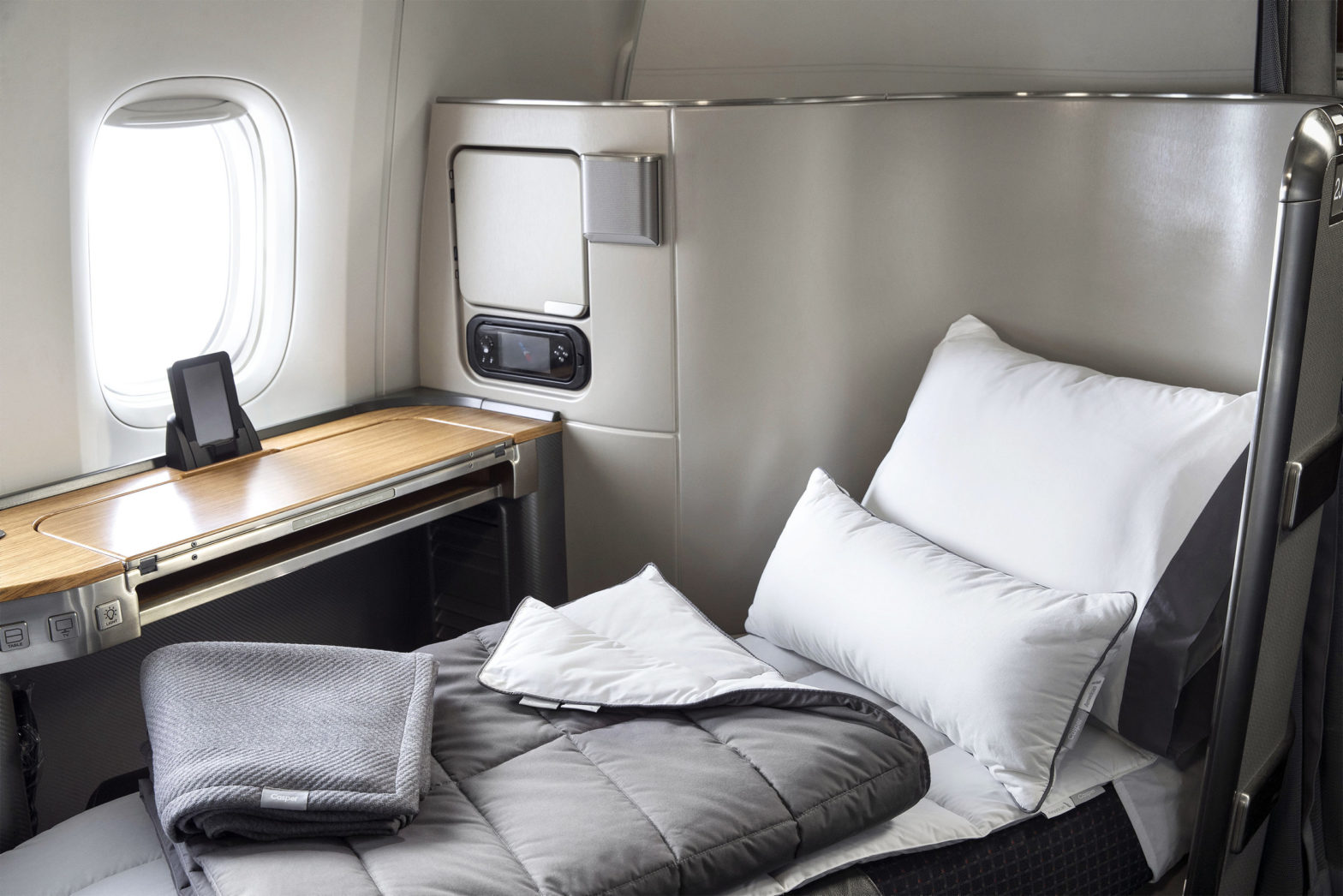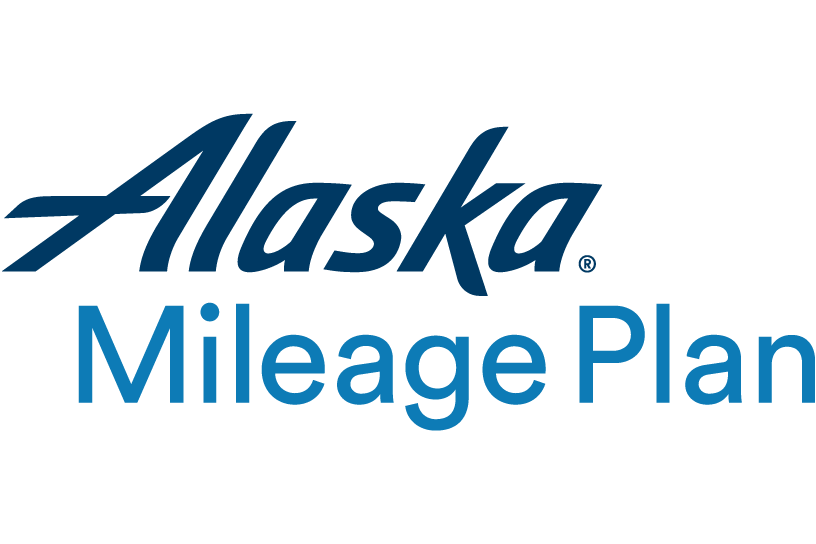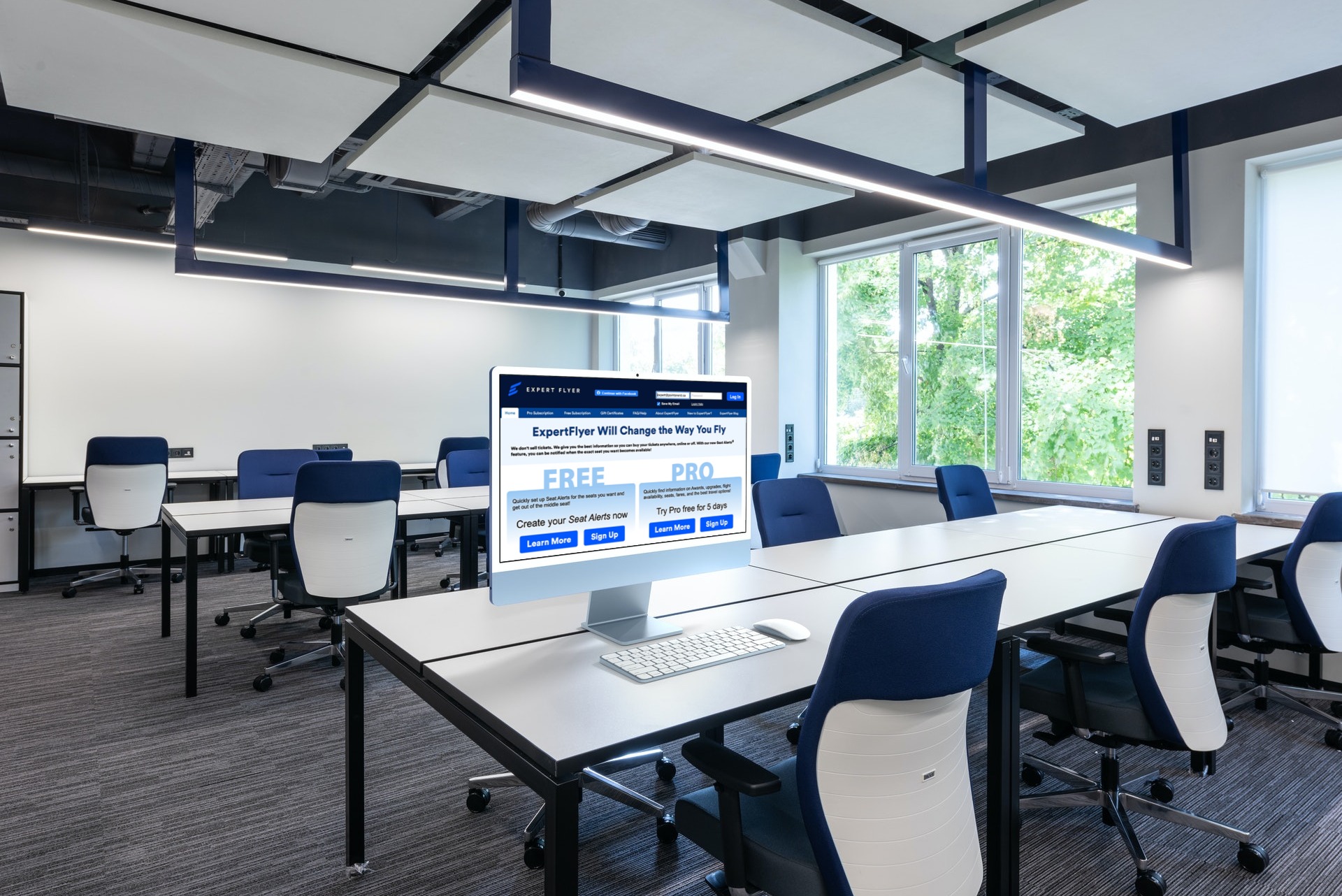Consistently ranked among the best airlines in the world, Japan Airlines naturally has one of the most sought-after business class experiences. Everyone wants to try the luxury it entails for themselves, but with the demand comes the difficulty of booking award seats.
In this guide, we’ll walk you through everything you need to know about booking Japan Airlines business class — from the experience to tips and tricks on how to fly it for free using a Miles & Points strategy.
The Japan Airlines Business Class Experience
Ground Experience
Across all of Japan Airlines’s worldwide and domestic destinations, there are exclusive counters for its business class passengers for expedited check-in, with its bigger hubs, Tokyo-Narita and Osaka-Kansai, having dedicated rows.
Business class passengers are invited into its Sakura Lounge. Outside Japan, these JAL-branded lounges are also available in Honolulu, San Francisco, Frankfurt, Bangkok, and Manila.
The flagship Sakura Lounge is located in Japan Airlines’s global hub, Tokyo-Narita. Spread across two floors, the lounge features a clean, warm Japanese aesthetic and an abundance of natural light.
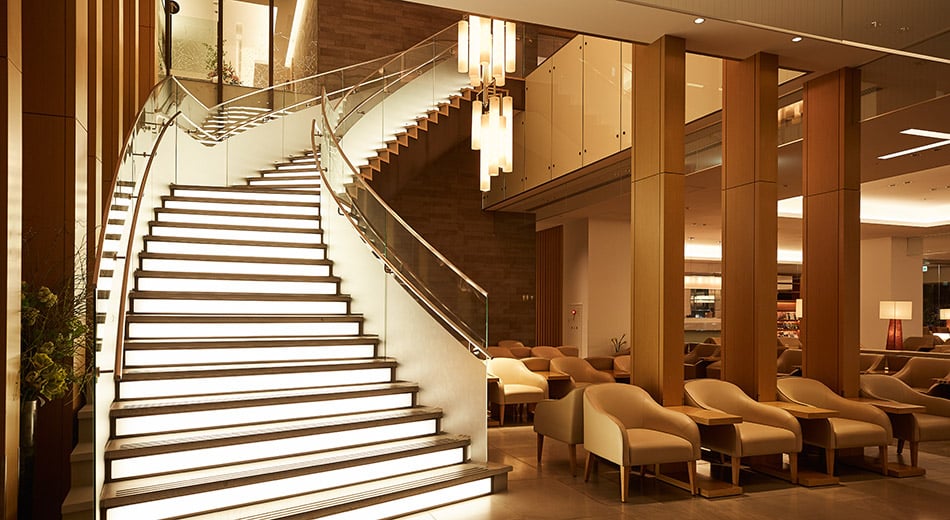
The lower level features plenty of seating and workstations with views of the runway. Also on the same level are showers, a kids’ section, and a business centre.
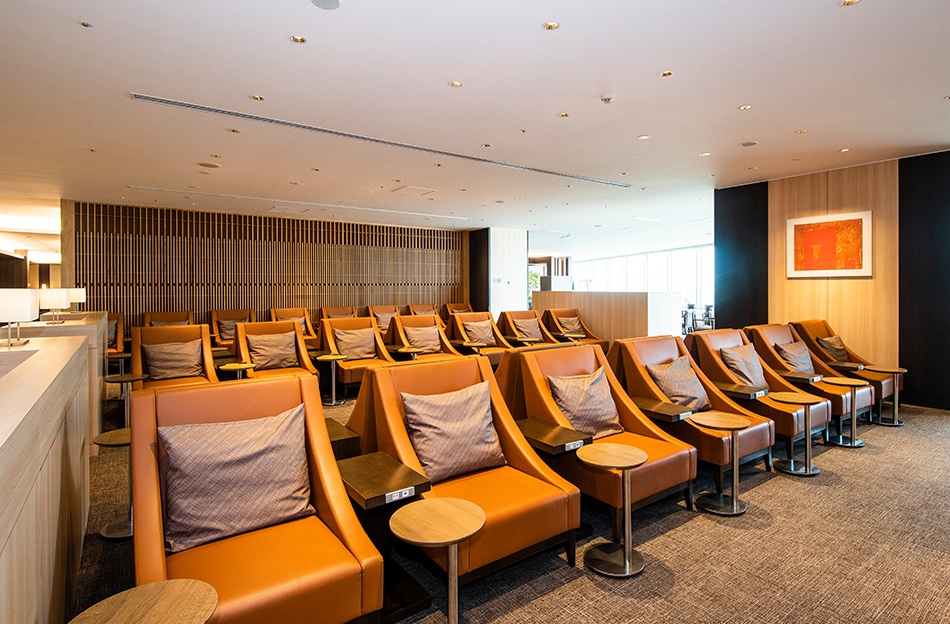
Meanwhile, the dining area on the upper level features a buffet with an ample selection of food, including the airline’s famous beef curry and breads from French boulangerie Maison Kayser.
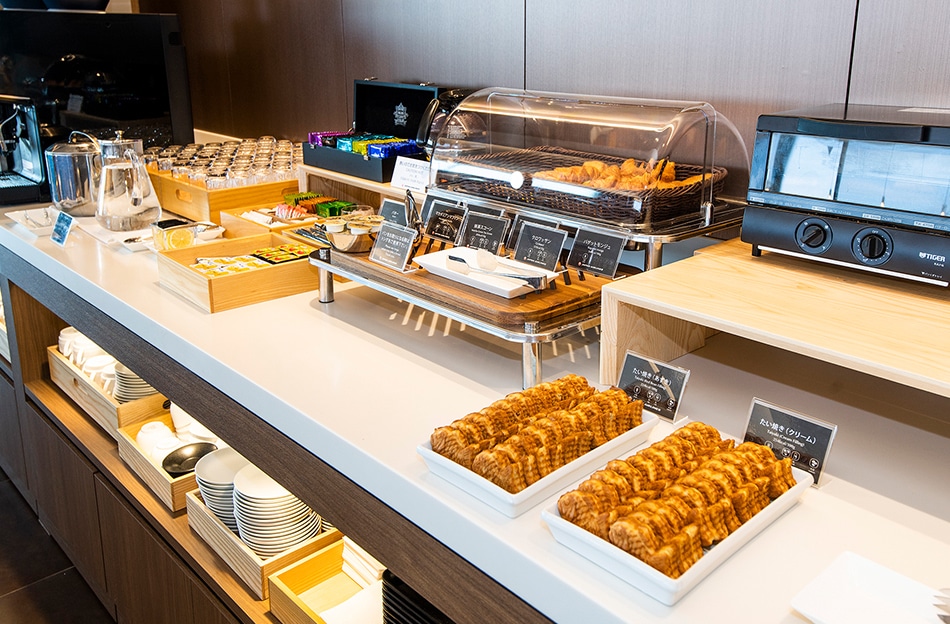
The lounge’s bar selection includes sake and top-shelf whiskey, as should be expected of Japan’s flag carrier.
Seats
As will be discussed in detail below, Japan Airlines operates a variety of business class seats, with the flagship being the JAL Sky Suite.
The three iterations of the JAL Sky Suite are solid business class seats — all transform into lie-flat beds that are furnished with mattress pads and pillows for comfort.
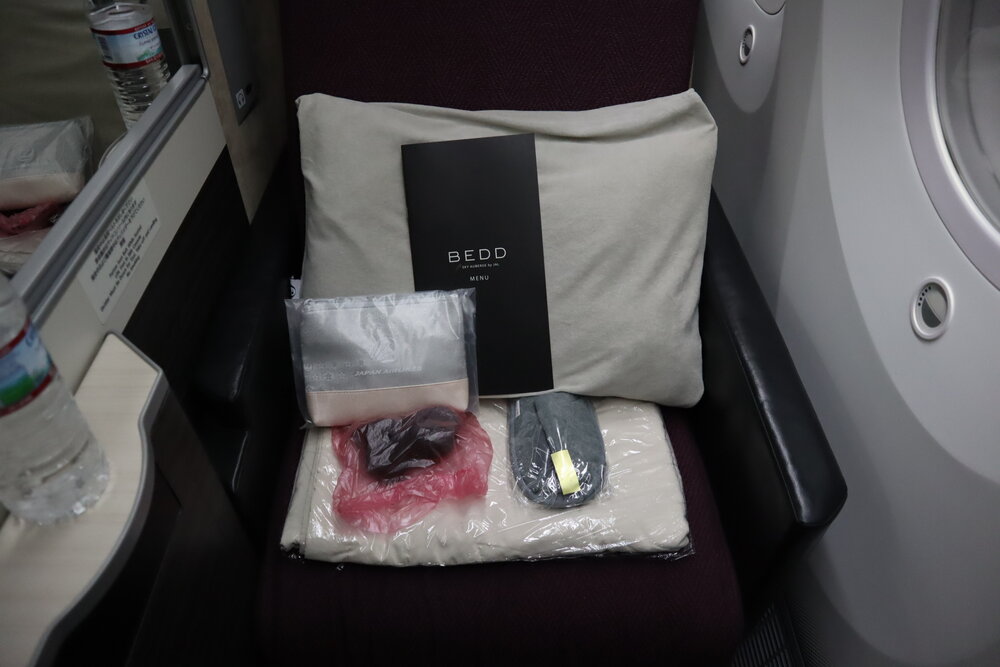
The large in-flight entertainment screens on the seats are complemented by Sony noise-cancelling headphones.
Lastly, waiting on each seat is an amenity kit by Maison Kitsune that contains a toothbrush set, earplugs, eye mask, pocket tissue, and moisture mask.
Food and Drink
Japan Airlines markets its in-flight dining as BEDD Sky Auberge, which involves collaborations with Japanese chefs from top restaurants to curate its menu. At the helm of its business class dining for flights departing Tokyo is Chef Jun Mishina of Ren Mishina, a Michelin-starred restaurant in Ginza.
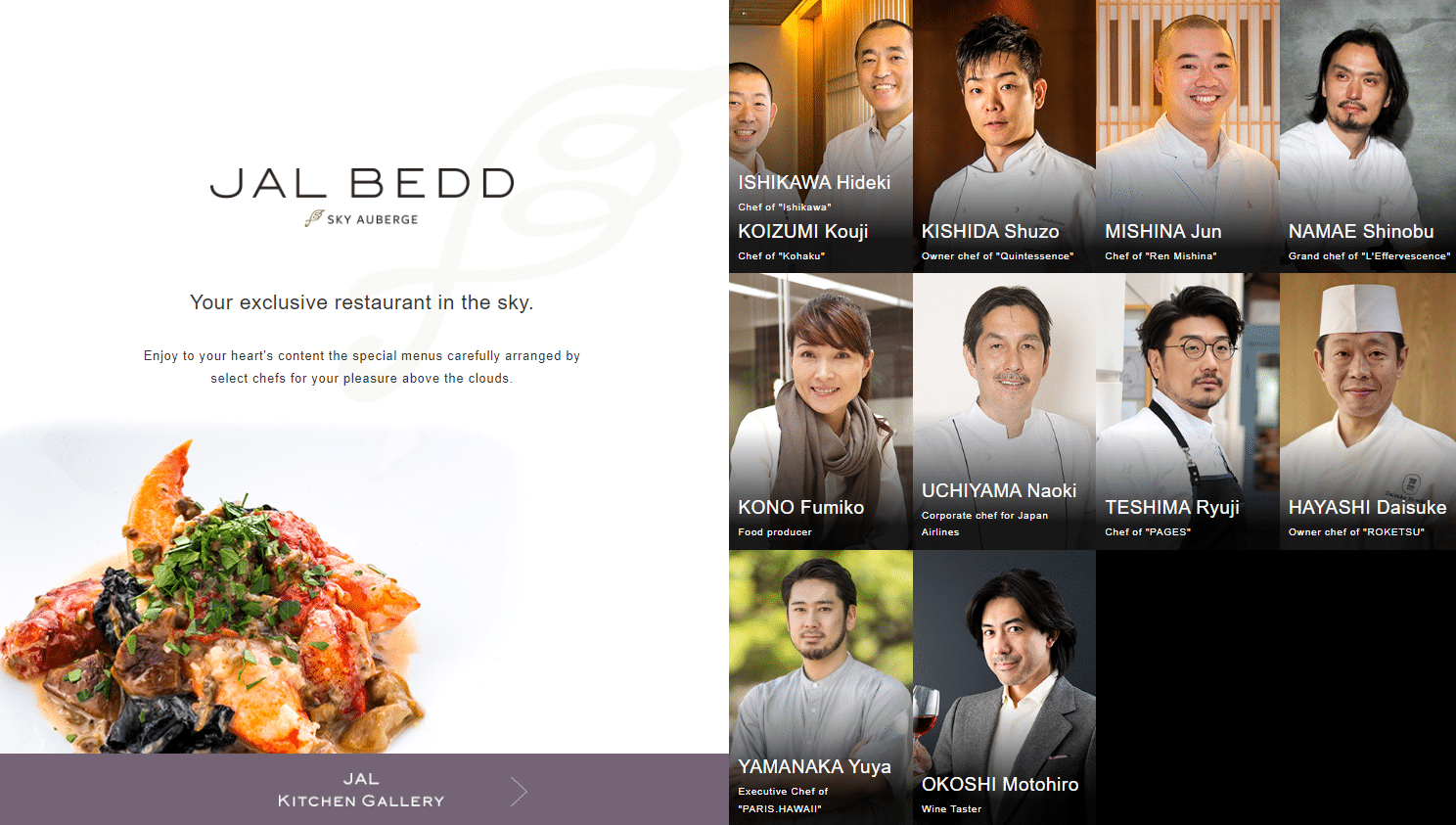
Available on flights to all of its regional and long-haul destinations, the Japanese menu makes use of luxurious ingredients, such as snow crab, abalone, and black cod.
While rivals highlight their wine selection, Japan Airlines’s focus is, understandably, Japanese spirits — it serves a selection of sake and whiskey that vary according to the flight. However, note that Japan Airlines also does serve Champagne, the Drappier Carte D’Or N.V., as well a selection of other wines.
Japan Airlines Business Class Cabin
There are seven types of aircraft on Japan Airlines’s fleet. Most feature the flagship JAL Sky Suites, but you may also find yourself on one of the airline’s older cabins.
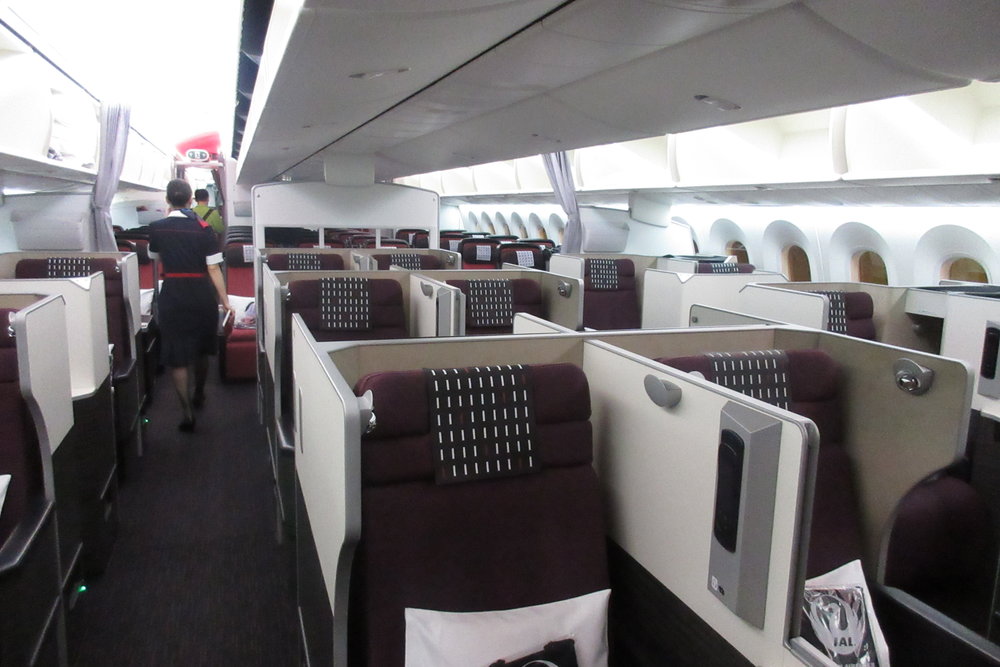
Fortunately, at the time of booking, you’ll see the aircraft type and seat map on your prospective flights, or alternatively, you can use tools, such as Expertflyer and SeatGuru. Keep in mind, however, that there might sometimes be last-minute aircraft swaps.
Below, let’s explore Japan Airlines’s various business class products.
JAL Sky Suite
Japan Airlines’ flagship business class seats are branded as the JAL Sky Suite. It has three versions: the JAL Sky Suite, JAL Sky Suite II, and JAL Sky Suite III. All of them transform into full lie-flat beds, allow for direct aisle access, and feature a host of seat features, such as USB port and AC power outlet — all in all, solid products.
The three are also different in a few ways, including the size of the in-flight entertainment screen, the stowage spaces available, and the size of the seats themselves. The primary difference, however, is how the seats are configured in the cabin.
The JAL Sky Suite is featured on the Boeing 787-9, Boeing 787-8, and Boeing 777-300ER. When in the cabin, this subtype of the Sky Suite is arranged in a staggered 1-2-1 configuration.
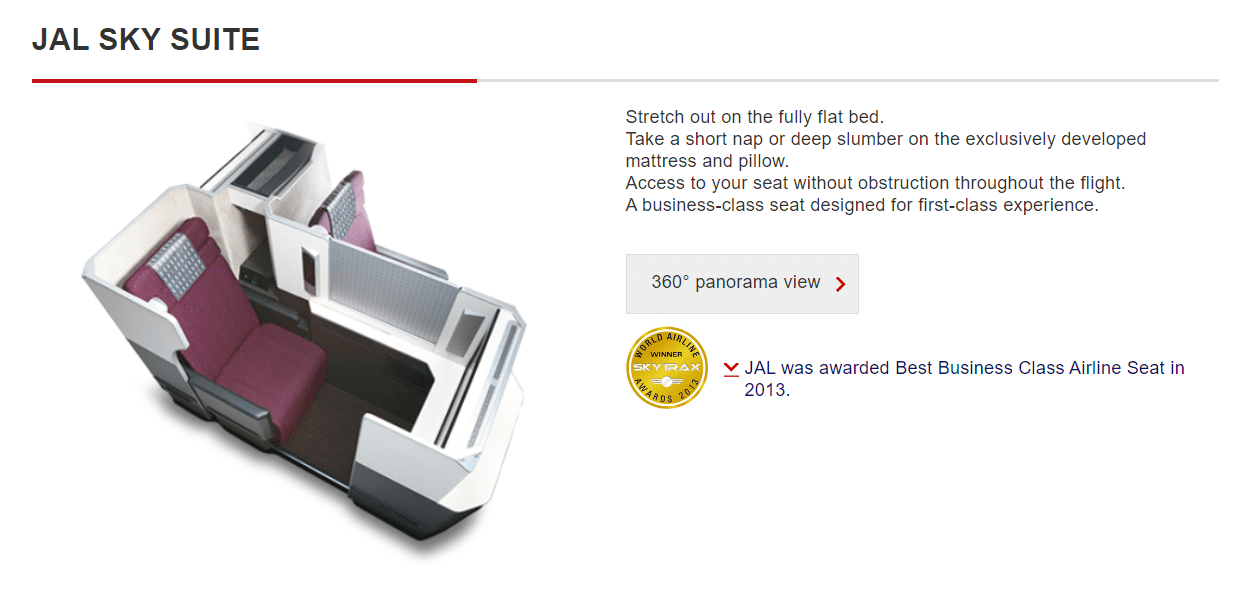
The staggered placement means that the seats near the windows can either be away (rows A and K) or near the aisle (rows C and H), with the former providing more privacy. Don’t worry though if you won’t be able to snag one of the more private seats, since all seats feature a door that closes completely for privacy.
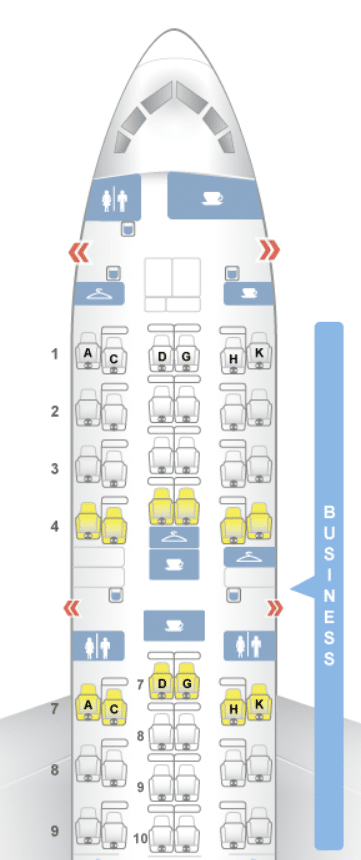
Paired seats on both the window and the middle (rows A/C and H/K) are great for couples, since all seats have a retractable partition to transform them into “honeymoon” seats.
Next up is the JAL Sky Suite II, which is featured solely on the Boeing 767-300ER. This seat subtype is arranged across six rows in a 1-2-1 staggered configuration.
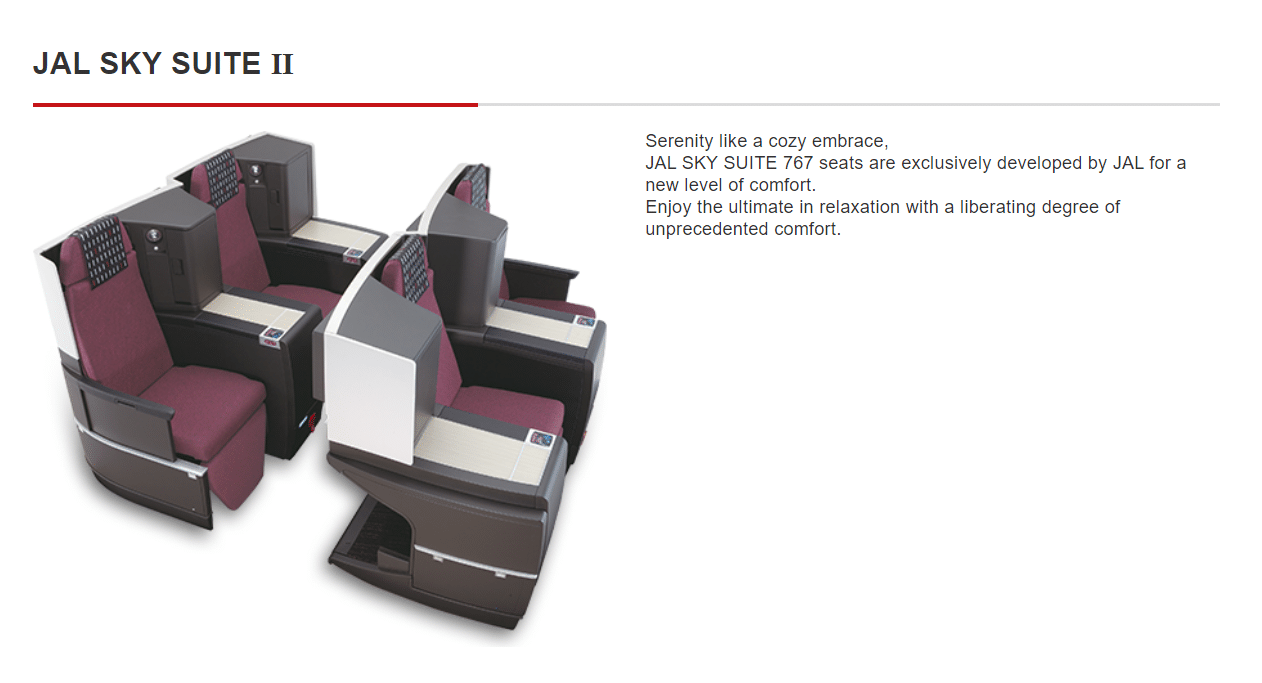
Row A and K window seats on even rows (rows 2, 4, 6) feature more privacy, since the console shields the seat from the aisle. The even row seats, on the other hand, come with a side table by the window.

For couples, this configuration may be a bother because all middle seats are separated by a console. It might even be better to pick seats A and D on odd rows (rows 1, 3, 5), since you can still see each other across the aisle.
Lastly, the JAL Sky Suite III are fitted into new Boeing 787-9 and Boeing 777-200ER aircraft. Like on other seating charts, these seats are arranged in a 1-2-1 configuration, though in a reverse herringbone pattern.
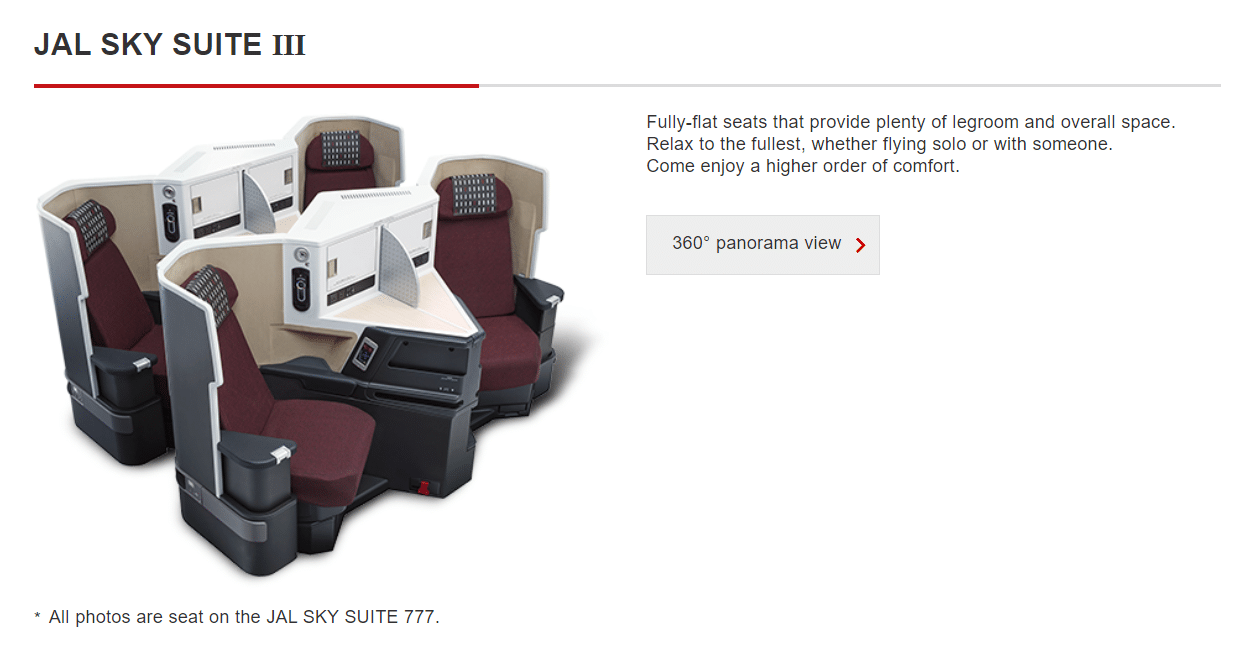
For solo travellers, seats that face the window are ideal. For couples, meanwhile, the middle seats are ideal, since they face toward each other with a retractable centre partition.
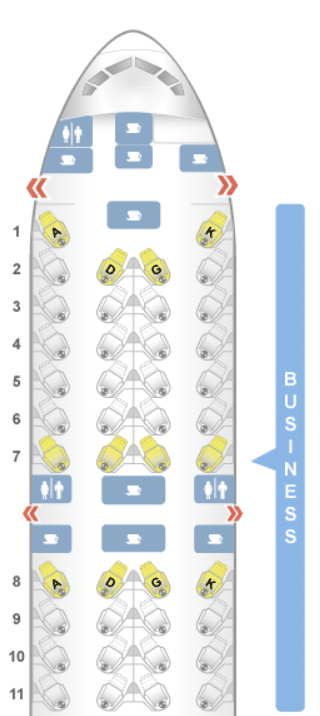
JAL Shell Flat Neo
The JAL Shell Flat Neo is featured exclusively on the Boeing 787-8 in a denser, six-row 2-2-2 configuration. This seat type is a pod-style recliner, making it inferior to the JAL Sky Suite.
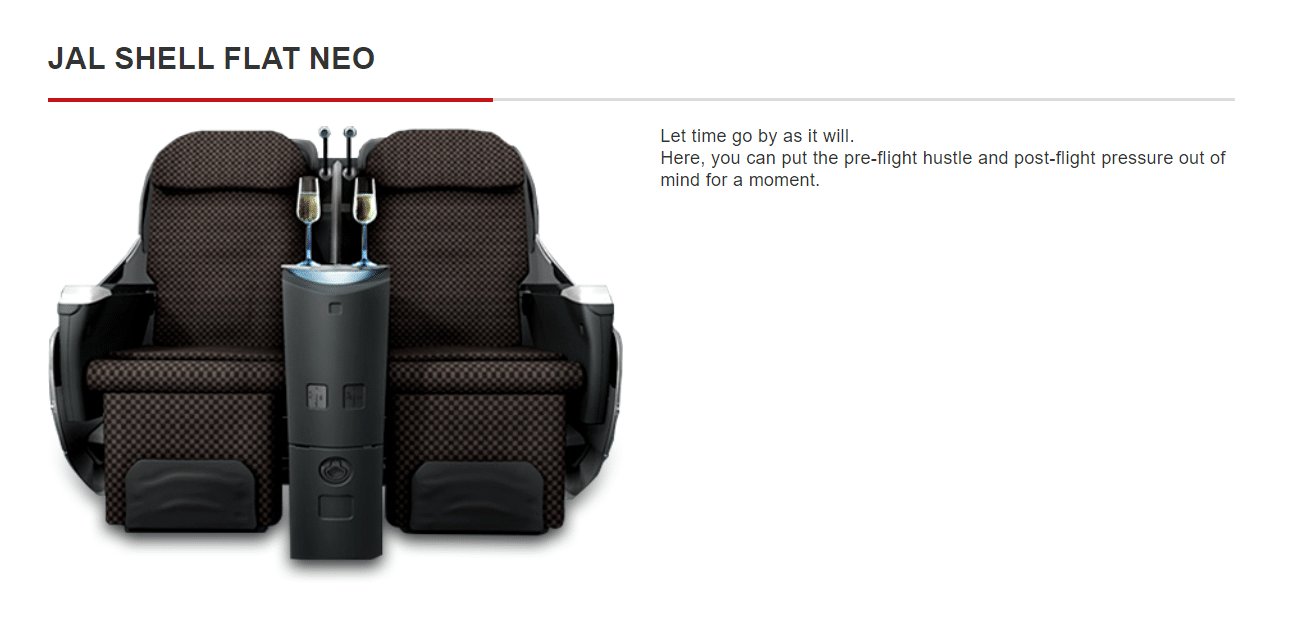
Still, the seats go into the relax/lounging and bed positions to afford some comfort, and the large privacy partition creates some privacy.
JAL Skyrecliner and JAL Skyluxe Seat
These seat types are merely recliner seats configured in dense 2-2-2 (widebody) or 2-2 (narrowbody) configurations.
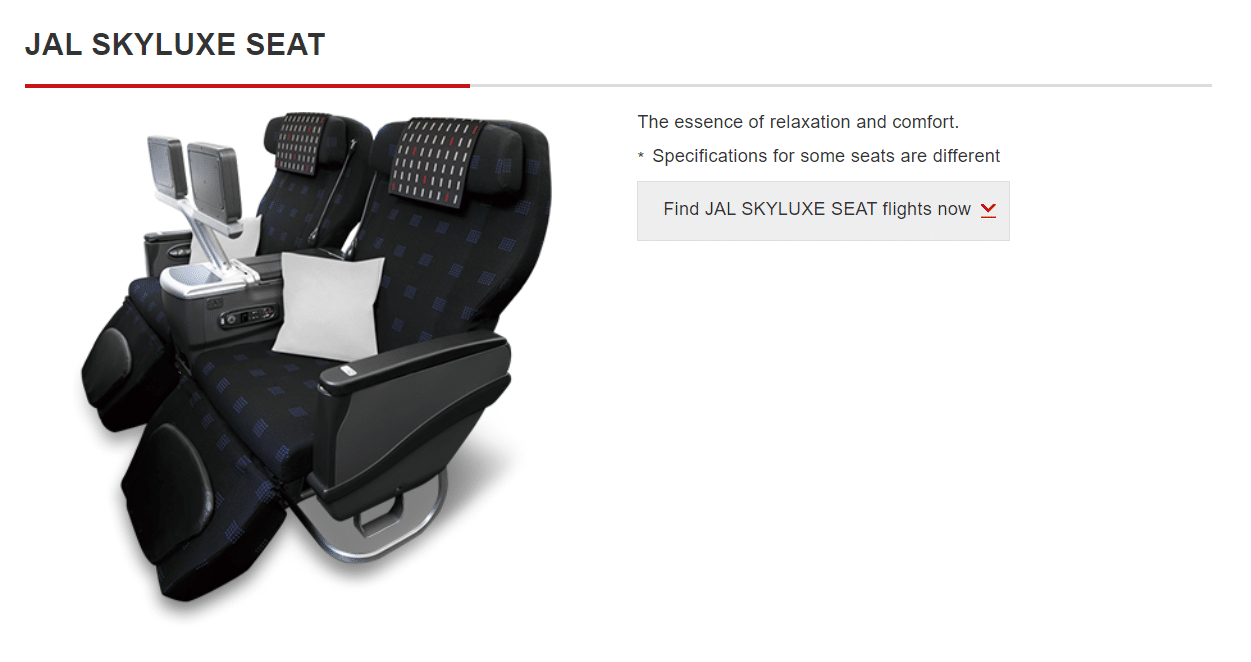
These seats are on older aircraft. If you have a choice, skip them altogether, especially on longer flights.
JAL First Class (Domestic)
Like airlines in the United States, Japan Airlines markets its business class on domestic flights as JAL First Class.
There are two similar types of JAL First Class seating on domestic flights — the difference lies mostly on how they look. However, both are pod-style recliner seats with a centre partition, and the seats are arranged in a 2-2-2 configuration.
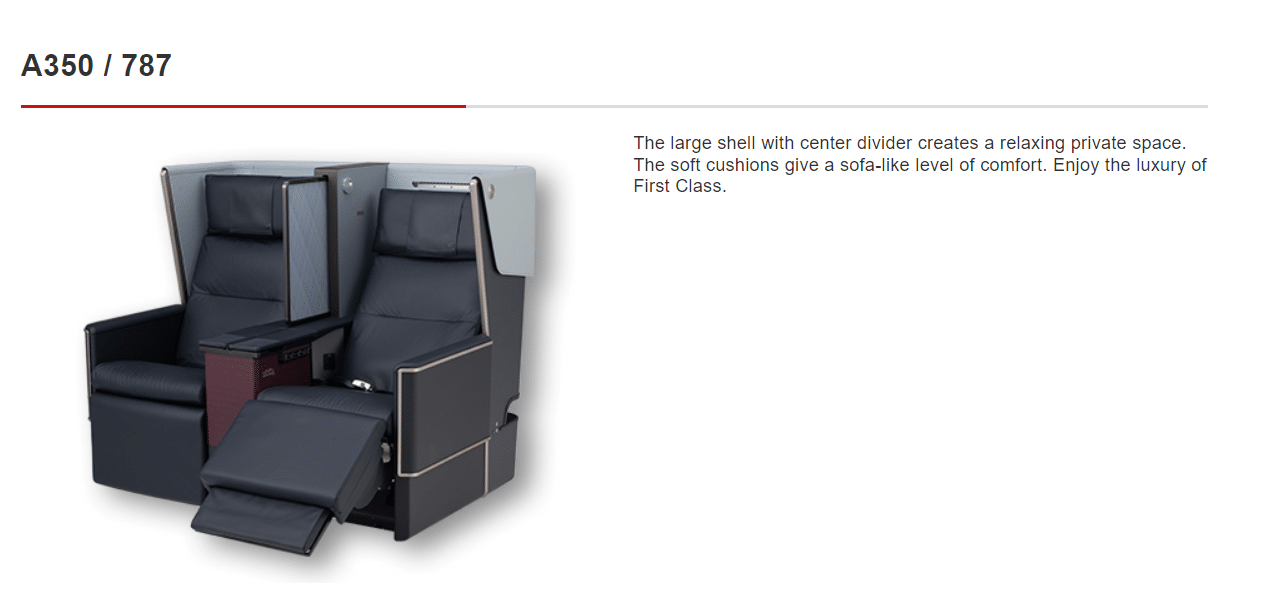
The seats are certainly adequate for domestic flights in Japan, where even longer routes like Tokyo-Haneda to Naha (Okinawa) clock in at less than three hours.
Japan Airlines Business Class Routes
Japan Airlines currently flies to nine destinations in North America, including the usual gateway cities of Vancouver, Los Angeles, and New York. The carrier then connects North America to destinations mostly in East and Southeast Asia.
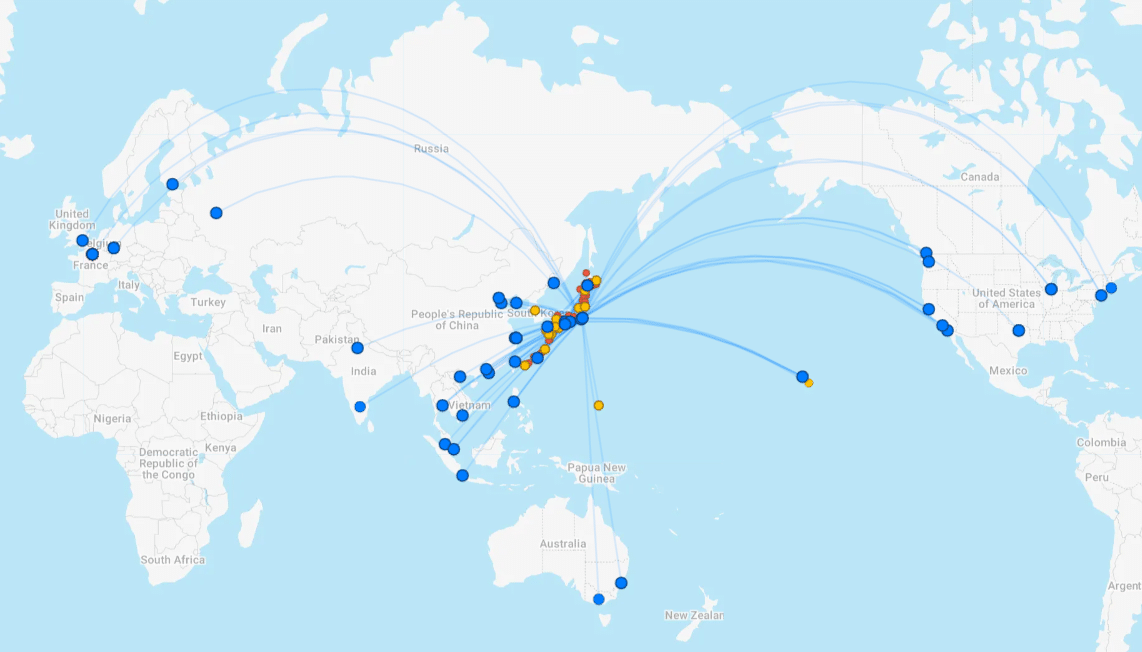
Japan Airlines also focuses on flights to Hawaii to serve the Japanese diaspora, as well as key European destinations. You can expect business class on all of its international destinations.
How to Redeem Points for Japan Airlines Business Class
Japan Airlines’ own program JAL Mileage Bank unfortunately has no credit card transfer partners in Canada nor the US, so we won’t delve deeply into it.
However, frequent flyers on Japan Airlines and other oneworld carriers, such as American Airlines, British Airways, and Alaska Airlines may credit enough points to JAL Mileage Bank for redemption. Plus, Japan Airlines is also partners with non-alliance carriers, such as LATAM and Emirates, for reciprocal mileage earning.
Moreover, Japan Airlines is one of the many airline transfer partners of Marriott Bonvoy, and in Canada, there’s the Marriott Bonvoy American Express Card. However, with a conversion rate of 3,000 Bonvoy points = 1,000 JAL miles, saving those Bonvoy points for aspirational hotel or resort stays might be a better idea.
The best way to book Japan Airlines business class then is to redeem with carriers where credit cards have a transfer partnership with.
In Canada, those include British Airways Executive Club (Avios), American Airlines AAdvantage, Cathay Pacific Asia Miles, and Alaska Airlines Mileage Plan.
However, when booking through a partner, reward availability may vary between partners and with Japan Airlines itself. Hence, before transferring points from your credit card, make sure you have your desired redemption lined up first.
British Airways Executive Club (Avios)
British Airways Avios can be accumulated by transferring from RBC’s Avion credit cards at a ratio of 1 Avion point = 1 Avios, with conversion bonuses of up to 30-50% happening once in a while. There’s also the British Airways-branded credit card also issued by RBC in Canada.
Similarly, you may convert American Express Membership Rewards points at a rate of 1 MR point = 1 Avios.
Credit Card
Best Offer
Value
150,000 MR points
$2,234
Apply Now
140,000 MR points
$2,021
Apply Now
70,000 MR points
$1,676
Apply Now
40,000 MR points
$846
Apply Now
15,000 MR points
$372
Apply Now
$99 annual fee
$0
Apply Now
Avios can be redeemed based upon a distance-based chart, and the chart for redeeming with one partner carrier, or two or more carriers costs more than purely British Airways, Iberia, Aer Lingus, and Vueling redemptions.
British Airways’s redemption chart is divided into zones by distance. For example, Vancouver to Tokyo-Narita corresponds to a distance of 4,674 miles, placing it at Zone 6 (4,001-5,500 miles). This means a one-way business class ticket would cost 77,250 Avios.

Adding a Tokyo-Narita to Bangkok connecting flight would mean a total of 7,563 miles, placing the entire itinerary at Zone 9 (7,001+ miles). This means a one-way business class award would cost 154,500. Note how the redemption required doubled by adding only 2,889 miles, so plan your connecting flights carefully!
Japan Airlines business class rewards are available to be booked directly through the British Airways Executive Club website.
American Airlines AAdvantage
American Airlines AAdvantage is a transfer partner of RBC’s Avion program, which allows transfers at a rate of 1 Avion point = 0.7 AAdvantage mile.
| Credit Card | Best Offer | Value | |
|---|---|---|---|
| 55,000 RBC Avion points† | $1,080 | Apply Now | |
|
Up to 70,000 RBC Avion points†
$399 annual fee
|
Up to 70,000 RBC Avion points† | $801 | Apply Now |
|
35,000 RBC Avion points
$175 annual fee
|
35,000 RBC Avion points | $700 | Apply Now |
| 35,000 RBC Avion points | $580 | Apply Now | |
| 35,000 RBC Avion points† | $580 | Apply Now |
American Airlines has separate redemption charts for its own flights and for flights of its partner airlines. The good thing is, the chart for partner business class awards isn’t subject to dynamic pricing, unlike how redemptions involving American Airlines flights are.
The AAdvantage chart is divided into geographic zones. Canada is grouped with the 48 contiguous US states, while Japan is grouped under Asia Region 1 with Korea.
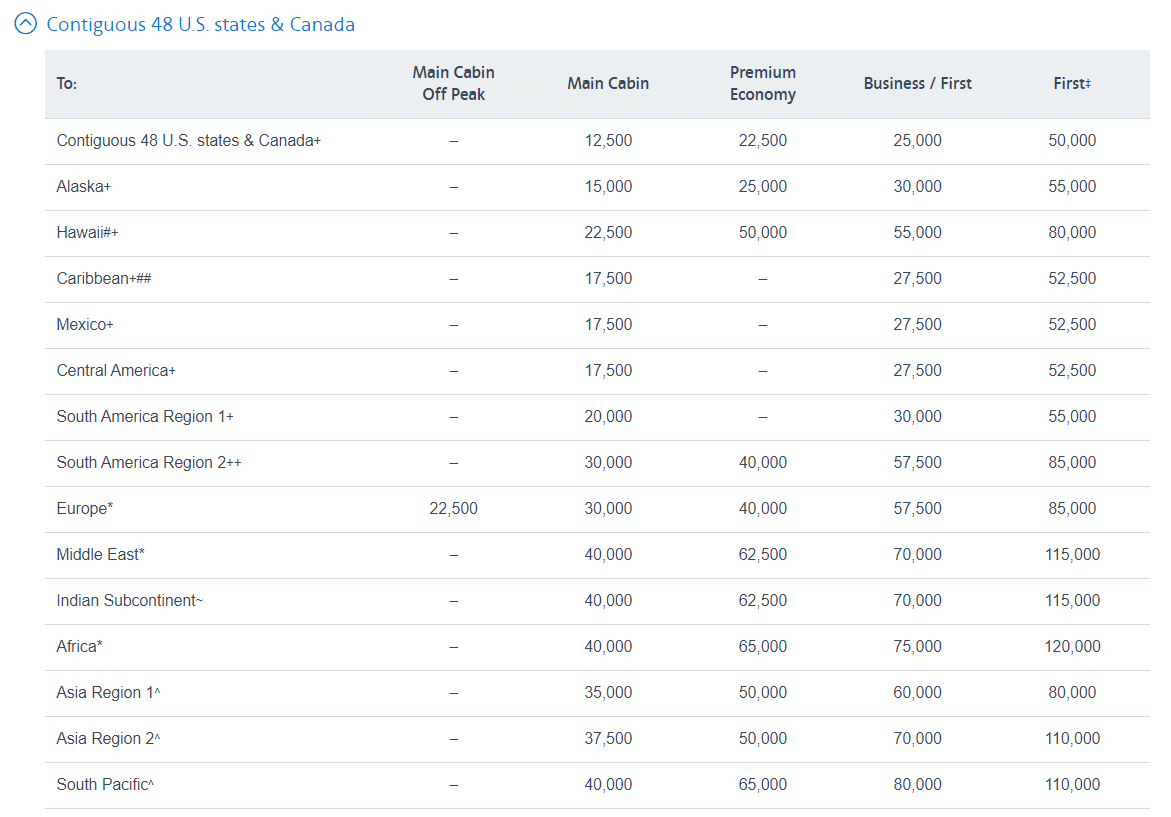
Hence, it costs 60,000 AAdvantage miles to fly from Tokyo to either New York or Vancouver, making East Coast redemptions better value.
An implication of this zone-based chart is the effect of adding a connecting flight. While adding a connecting flight to Korea, which also falls under Asia Region 1, would require the same number of points as flying to Japan, travelling to other parts of Asia or the South Pacific zone would require an additional 10,000 or 20,000 miles, respectively.
Japan Airlines business class awards are available to be booked through the American Airlines website.
Cathay Pacific Asia Miles
Cathay Pacific’s Asia Miles is a transfer partner of RBC’s Avion program at a ratio of 1 Avion point = 1 Asia Mile, with redemption bonuses offered once in a while.
Cathay Pacific does not publish a redemption chart for redemptions involving only one partner carrier, and it’s implied that each partner may require different number of miles. This means that to find out how many miles is required for a redemption on Japan Airlines business class, you’d have to use Cathay Pacific’s award search engine.
Doing some searches, we found that a one-way Japan Airlines business class award from Seattle to Tokyo-Narita costs 61,000 Asia Miles plus HK$2,895 (~$497 CAD) in taxes and fees. Unfortunately, Cathay Pacific passes on fuel surcharges on oneworld awards.
An interesting way to redeem Japan Airlines business class with Asia Miles is through its oneworld multi-carrier award. Unlike simpler partner award redemptions, it follows a definite, distance-based award chart for roundtrip redemptions.
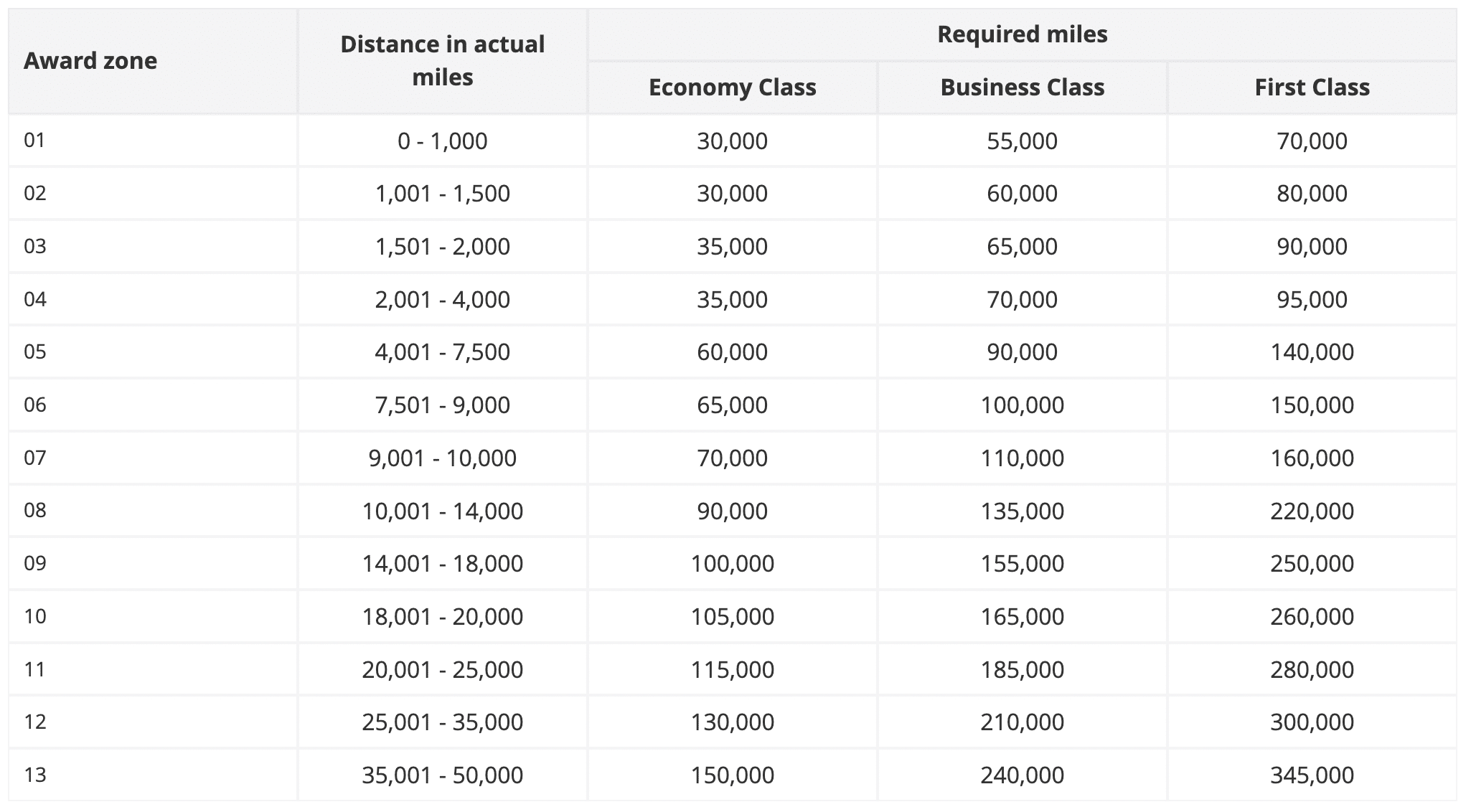
For this to work, you must fly with two oneworld carriers, or three if including Cathay Pacific. This method of redemption opens up possibilities of epic round-the-world itineraries.
Japan Airlines business class rewards are available to be booked directly through the Cathay Pacific website.
Alaska Airlines Mileage Plan
Alaska Airlines Mileage Plan used to be a favourite to book award travel, especially when it joined the oneworld alliance. However, recent devaluations, including one specifically for Japan Airlines First Class awards, have made the program less lucrative than before.
Moreover, MBNA has wound down its Alaska Mileage Plan-branded credit card and thus is not accepting new applications anymore. This leaves Canada with virtually no credit card to earn the currency for now. Still, the program a viable avenue to book Japan Airlines business class award seats.
Mileage Plan’s geographic zone-based award chart is simple, but it uses “business starting from” wording, implying that the miles needed to redeem varies.
Miles required varies not only by distance but also by partner, so flying Japan Airlines business class may cost more or less than flying other partners like Singapore Airlines, even on the same city pairs.
Japan Airlines business class rewards are available to be booked directly through the Alaska Airlines website.
Japan Airlines Business Class Award Availability
Frankly, Japan Airlines business class awards, especially long-haul, are hard to come by; economy flight awards are easier to find. However, with patience, you can find the odd available seat.
Based on searches, the carrier releases different award seats to its partners, so you have to patiently search with your preferred mileage programs.
Fortunately, there are ways to make the search easier. For instance, here’s Alaska Airlines’ search engine with the ability to filter by carrier.
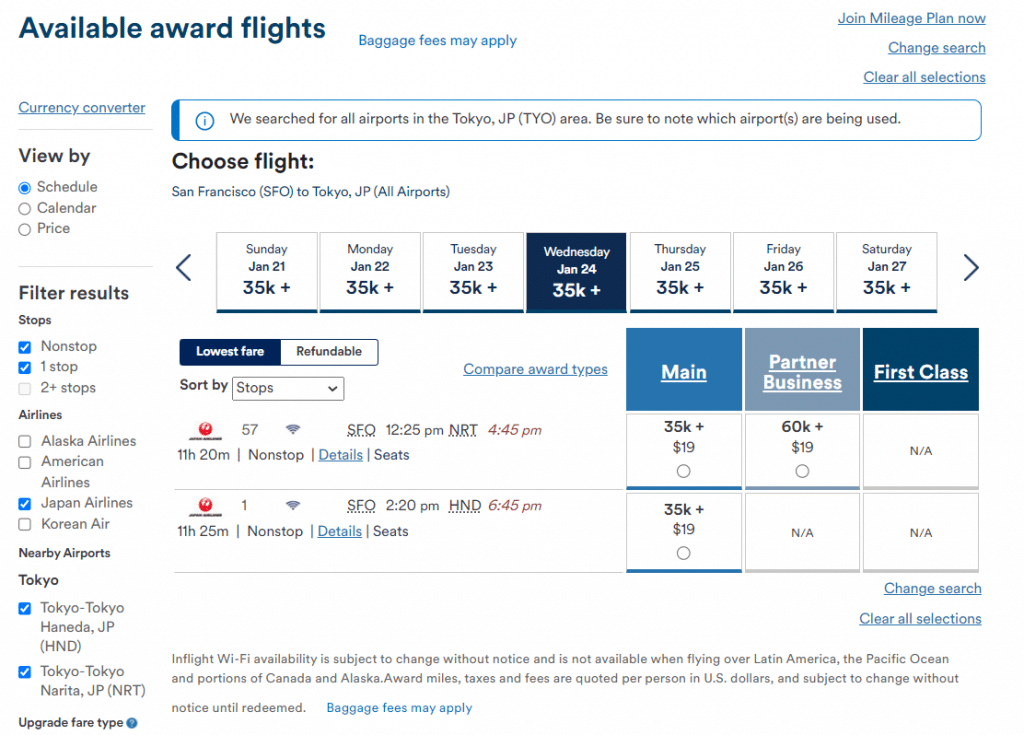
On the other hand, here’s American Airlines’ search engine that has a calendar view option. When you see the lowest-priced reward, it would likely be on a partner like Japan Airlines, since American Airlines imposes dynamic pricing on redemptions involving its own flights.
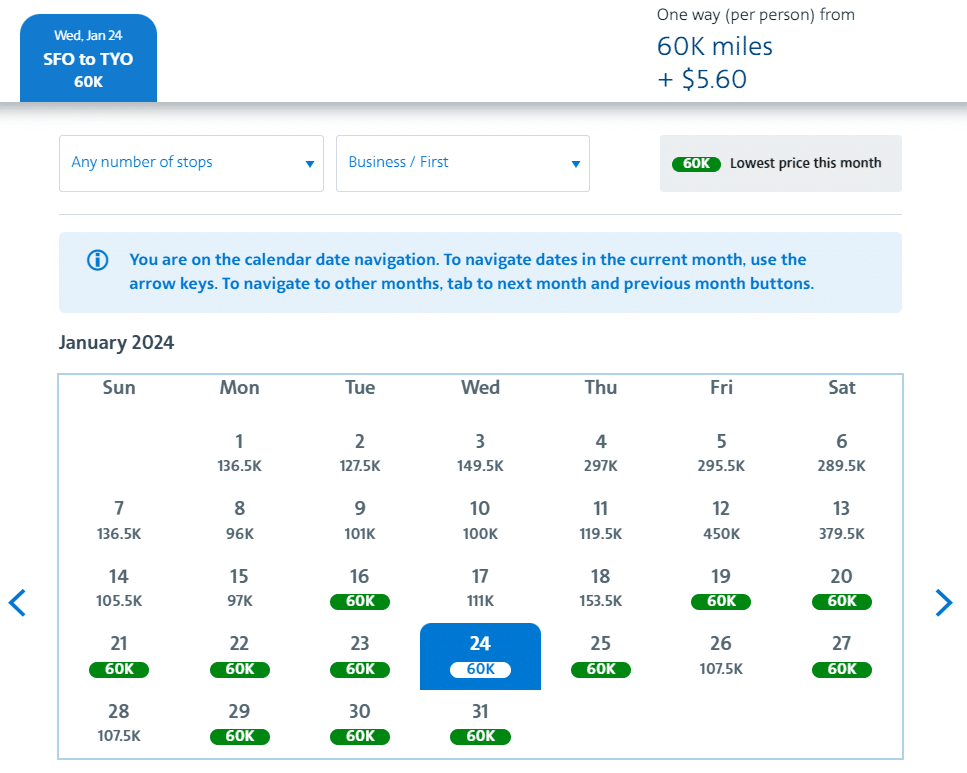
Of course, there’s ExpertFlyer, a paid tool that can search availability.
Tips & Tricks for Japan Airlines Business Class
Compare Miles and Cash Required Among Programs
Each frequent flyer program is structured differently, so a Japan Airlines business class seat costs differently on its own mileage program and across partner airlines. The key then is to compare the required number of miles and applicable taxes and fees, including the dreaded fuel surcharge.
Let’s take one simple example, Los Angeles to Tokyo-Narita. It requires:
-
- 77,250 British Airways Avios + US$495 in taxes and fees
- 60,000 American Airlines AAdvantage miles + US$6 in taxes and fees
- 75,000 Cathay Pacific Asia Miles + HK$3,365 (~US$429) in taxes and fees
- 60,000 Alaska Airlines Mileage Plan miles + US$19 in taxes and fees
With British Airways and Cathay Pacific passing on fuel surcharges on partner award bookings, they’re clearly the least favourable way to book Japan Airlines business class seats. You’re better off converting your RBC Avion points, for instance, to AAdvantage miles.
Find the “Sweet Spots”
To find “sweet spots”, you must study the award charts of different airline partners, which allow Japan Airlines business class redemptions.
Let’s take American Airlines AAdvantage as an example. You can fly Japan Airlines business class from New York to Tokyo using 60,000 AAdvantage miles. However, since Seoul is in the same zone (Asia Region 1) as Tokyo in AAdvantage’s award chart, you can add a connecting flight without needing more miles for your redemption.
Therefore, you get to fly approximately 7,500 miles for only 60,000 AAdvantage miles. A similar redemption with Aeroplan would require at least 85,000 miles (or more with dynamic pricing).
Mix and Match Partner Awards
With Japan Airlines business class availability hard to come by, you must be flexible with your routing. Flexibility may mean involving connecting flights with partner airlines.
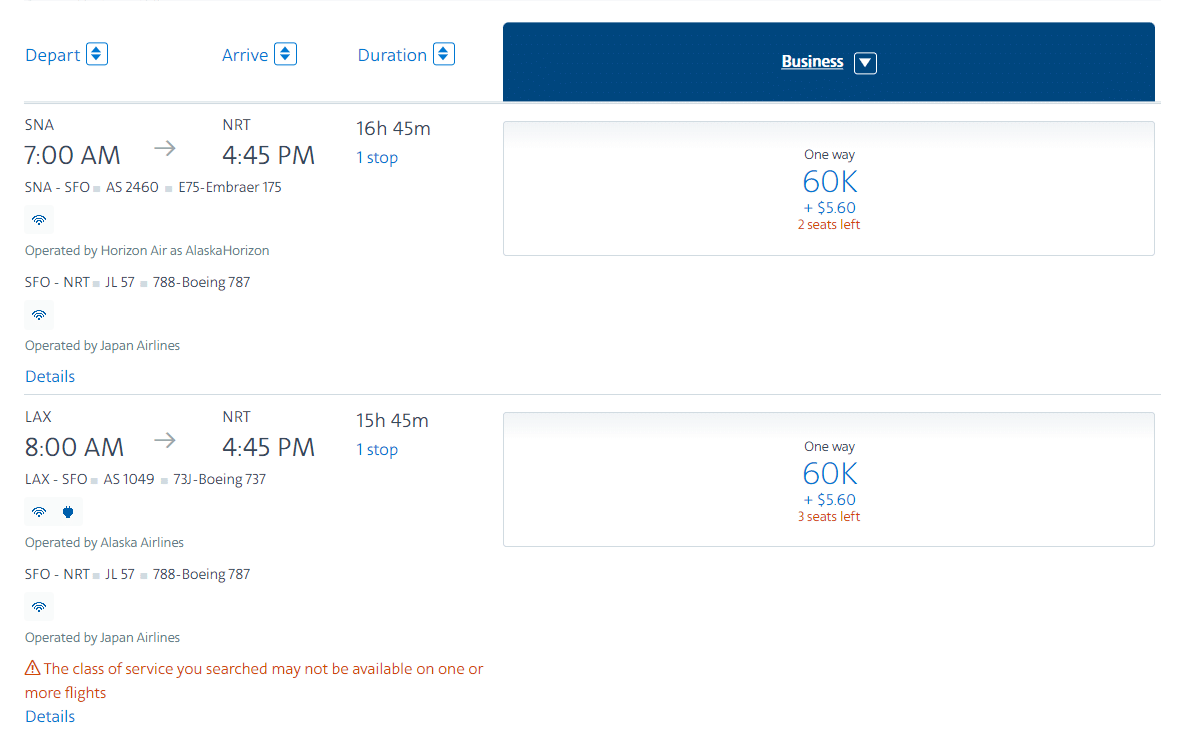
However, connecting flights might also mean more miles required for redemption, so make sure to do your math carefully.
Conclusion
Japan Airlines offers one of the best business class products in the world, thanks to its cutting-edge JAL Sky Suite and stellar service onboard.
With demand being high and availability being difficult, however, booking Japan Airlines business class award seats requires patience and flexibility.
You should keep your eyes on the prize though — in the end, you’ll be richly rewarded with one of the most coveted business class experiences.


